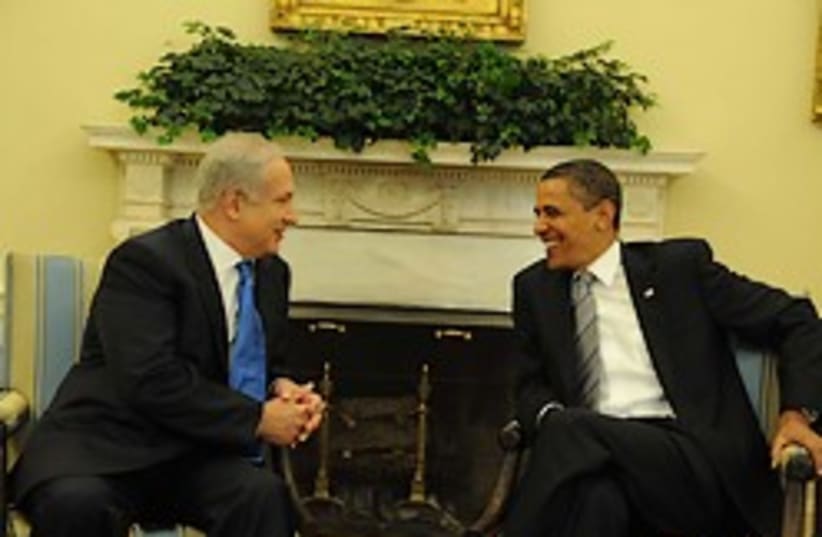The Obama administration has made a strategic decision to pressure Israel pointedly, relentlessly and publicly, while, for now at least, asking little of the Palestinians. The diversionary issue employed in this campaign is housing construction over the Green Line.
Washington cannot realistically think that Israel is going to knuckle under and stop building within strategic settlement blocs, or in post-'67 Jerusalem. So it appears that the administration is engaging in confrontation for the sake of confrontation. The object? To gain credibility with the Arab world in the belief it will give them an incentive to make peace.
It's the same failed approach pursued by practically every administration since 1967 - only on hyper-drive. And this time, it's characterized by manipulatively overplaying the chasm in the US-Israel relationship.
Thus US Defense Secretary Robert Gates ostentatiously warns against an Israeli military strike on Iran's nuclear bomb-making facilities on the grounds that it would undermine American interests. Yet, as the clock ticks, Washington still hasn't quite figured out how to "engage" the mullahs and talk them out of building a bomb.
The manipulation comes in various forms: word from the State Department that talk of a cut in US aid to Israel over the settlement controversy is "premature;" stories leaked to Israeli pundits sympathetic to the administration's line - for example, that George Mitchell will be packing binding timetables requiring Israeli concessions when next he arrives in our region. Or claims that Prime Minister Binyamin Netanyahu and President Barack Obama are headed for a "collision."
To heighten the sense of crisis, one newspaper here sympathetic to the administration's approach claims that the IDF is poised to evacuate all unauthorized West Bank outposts in one 24-hour blitz. The story is erroneous.
Further leaks claim that the Americans are planning an international peace conference which will find Israel isolated, facing the "moderate" Arab world, an unsympathetic Europe and an irritated administration. We're told that tensions between Washington and Jerusalem are so bad that the White House will send a "friendly face" (Dennis Ross) to accompany other ostensibly less sympathetic US officials.
IN RESPONSE, Israel engages in its own, clumsy manipulation.
Responding to implicit threats of a cut in military aid, the IDF is said to be "brainstorming" for the day when it will tell Washington what it can do with its $3 billion, because Israel will purchase what it needs to survive from Vladimir Putin's Russia.
And when our new ambassador to Washington, Michael Oren, held his first overview meeting at the State Department, it was Israeli officials who leaked the false story that he had been "summoned" to hear US protests over Jewish housing construction in east Jerusalem.
The Netanyahu government is wrong to think that exacerbating the perception of a crisis in US-Israel relations is the wisest method of setting "red lines" for future negotiations with the Palestinians. There must be better ways to point out that the Shepherd Hotel is located in the geographically vital Sheikh Jarrah section of the capital, a couple of bus stops from Hebrew University. Nor is playing up bilateral tensions a smart way to encourage the pro-Israel community, already signaling uneasiness over White House tactics, to speak out.
IT'S TOO bad that the Obama administration, which came to Washington promising change, is going down the old, demonstrably counter-productive road of its predecessors. It too fundamentally misreads the source of Arab reluctance to make peace with Israel.
Washington acts as if both sides want the same thing: coexistence. But the Arabs stillreject the right of a Jewish state to live anywhere in their midst; still favor demographically inundating Israel with Palestinian refugees and millions of their descendents; and still insist Israel pull back to the hard-to-defend 1949 Armistice Lines.
Under these circumstances, the administration's one-sided pressure on Israel, and its tepid response to Netanyahu's historic Bar-Ilan speech, entrenches Arab intransigence.
It's an even bigger shame that the administration is expending so much energy on an approach that actually reduces the prospects of a breakthrough - and that in so doing, it is employing manipulative tactics that make mainstream Israelis even more fearful of taking risks for peace.
| More about: | Vladimir Putin, Robert Gates, Michael Oren, Hebrew University of Jerusalem |
